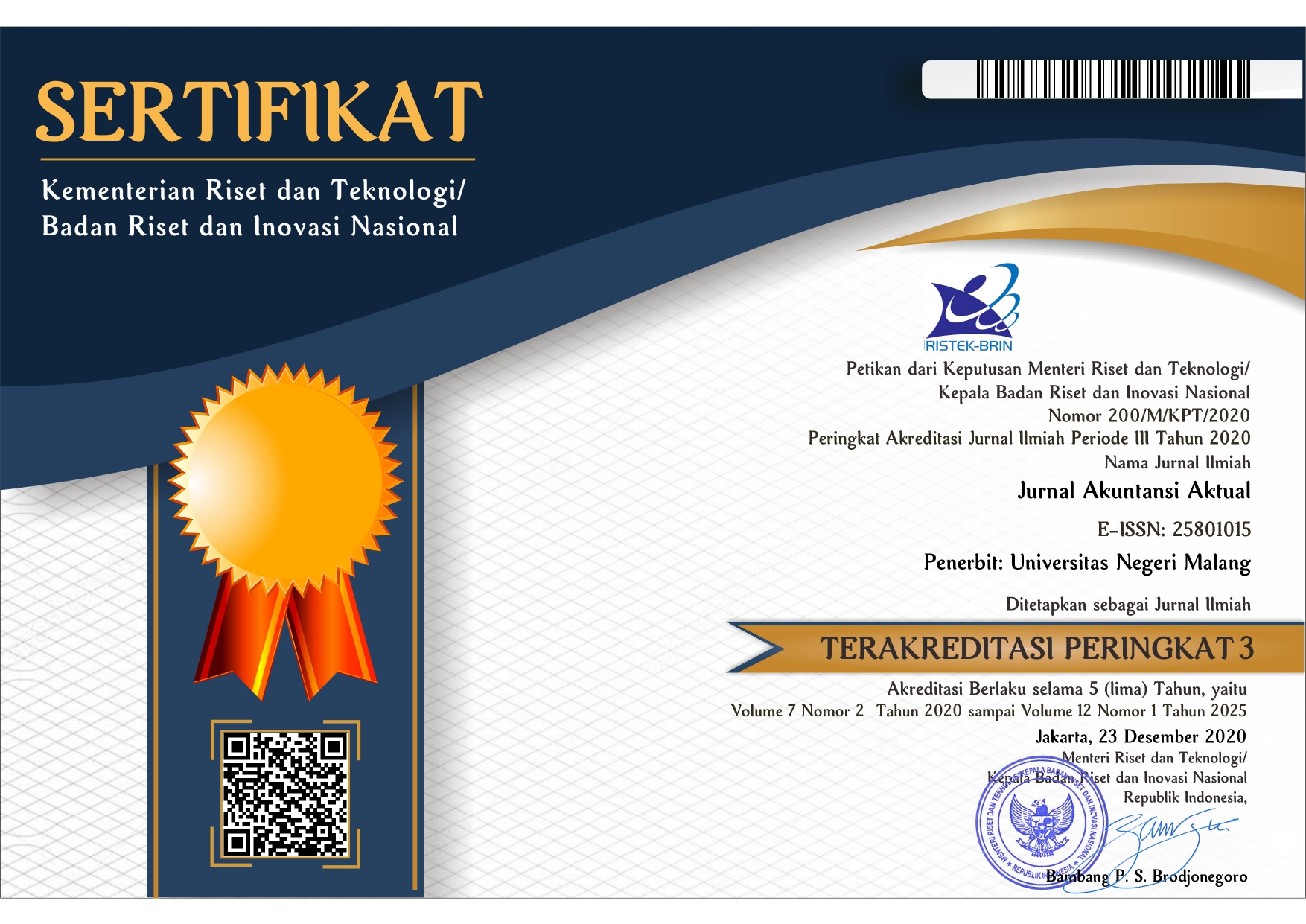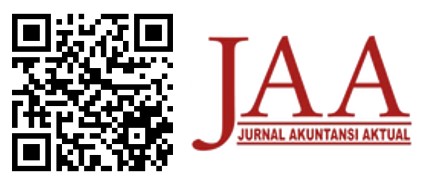PENGELOLAAN BANTUAN KEUANGAN BERSIFAT KHUSUS DARI PEMERINTAH KABUPATEN DALAM ANGGARAN PENDAPATAN DAN BELANJA DESA
Abstract
This research aimed to analyse the specially-allocated financial aid policy from district government to village government of Samanta. The fact indicates that there has been a misconduct in budget management, which becomes the main reason to do this research. This research employs a qualitative method, using the phenomenological-hermeneutic approach. Data collection uses an in-depth interview with village financial manager, and supported by observation and documentation. Data analysis applies the method of phenomenological-hermeneutic perspectives. The result shows that specially-allocated financial aid management was not appropriately implemented. This was caused by the inconsistency of local government in implementing its local regulation. District government is using its power discretion and the regulation discretion. High tendency of different interests in implementing the policy has led to a pseudo-statement to empower village government and village society. Thus, it needs better commitment from district government to set aside the interests of certain groups and politics to ensure that the main objective of that policy could be implemented properly.
Keywords
Full Text:
PDFReferences
Abdullah, S., & Asmara, J. A. (2006). Perilaku oportunistik legislatif dalam penganggaran daerah. In Simposium Nasional Akuntansi 9 Padang (pp. 23–26). Padang.
Abdullahi, R., & Mansor, N. (2015). Fraud Triangle Theory and Fraud Diamond Theory. Understanding the Convergent and Divergent For Future Research. International Journal of Academic Research in Accounting, Finance and Management Sciences, 5(4), 38–45. https://doi.org/10.6007/IJARAFMS/v5-3/1823
Alemu, D. S. (2016). Dysfunctional Organization: The Leadership Factor. Open Journal of Leadership, 5(March), 1–7. https://doi.org/http://dx.doi.org/10.4236/ojl.2016.51001
Arles, L. (2014). Faktor – Faktor Pendorong Terjadinya Fraud: Predator vs. Accidental Fraudster Diamond theory Refleksi Teori Fraud Triangle (Klasik) Suatu Kajian Teoritis.
Bagire, V., & Namada, J. M. (2013). Managerial Skills , Financial Capability and Strategic Planning in Organizations. American Journal of Industrial and Business Management, 3(September), 480–487. https://doi.org/http://dx.doi.org/10.4236/ajibm.2013.35055
Cole, M. S., Bruch, H., & Walter, F. (2008). Affective Mechanisms Linking Dysfunctional Behavior to Performance in Work Teams: A Moderated Mediation Study. Journal of Applied Psychology, 93(5), 945–958. https://doi.org/10.1037/0021-9010.93.5.945
Creswell, J. W. (2015). Penelitian Kualitatif & Desain Riset, Memilih di antara Lima Pendekatan. (S. Z. Qudsy, Ed.) (Indonesia). Yogyakarta: Pustaka Pelajar.
Creswell, J. W. (2016). Research Design: Pendekatan Metode Kualitatif, Kuantitatif dan Campuran. (H. E. Rais & Priyati, Eds.) (Keempat). Yogyakarta: Pustaka Pelajar.
Danish, R. Q., Munir, Y., Kausar, A., & Jabbar, M. (2014). Impact of Change , Culture and Organizational Politics on Organizational Learning. Review of Contemporary Business Research, 3(1), 115–126.
Darumurti, K. D. (2012). Kekuasaan Diskresi Pemerintah (Pertama). Bandung: Citra Aditya Bakti.
Dunn, W. N. (2000). Pengantar Analisis Kebijakan Publik (Kedua). Yogyakarta: Gadjah Mada University Press.
Efferin, S. (2015). Akuntansi,Spirituaitas, dan Kerarifan Lokal: Beberapa Agenda Penelitian Kritis. Jurnal Akuntansi Multi Paradigma, 6(3), 466–480. https://doi.org/10.18202/jamal.2015.12.6037
Ely, B. (2009). Bad Rules Produce Bad Outcomes : Underlying Public-Policy Causes of the U . S . Financial Crisis Interactions between Finance and Human Nature. Cato Journal, 29(1), 93–114.
Etienne, J. (2010, January). The Impact of Regulatory Policy on Individual Behaviour: A Goal Framing Theory Approach. Centre for Analysis of Risk and Regulation, (January), 1–26.
Fajri, R., Setyowati, E., & Siswidiyanto. (2012). Akuntabilitas Pemerintah Desa pada Pengelolaan Alokasi Dana Desa (ADD) (Studi pada Kantor Desa Ketindan , Kecamatan Lawang , Kabupaten Malang). Jurnal Administrasi Publik, 3(7), 1099–1104.
Gamar, N., & Djamhuri, A. (2015). Auditor Internal sebagai “ Dokter” Fraud. Jurnal Akuntansi Multi Paradigma, 6(1), 107–123. https://doi.org/10.18202/jamal.2015.04.6009
Griffin, R. W., & Lopez, Y. P. (2005). “ Bad Behavior ” in Organizations : A Review and Typology for Future Research. Journal of Management, 31(6), 988–1005. https://doi.org/10.1177/0149206305279942
Gul, Z. (2015). Impact of Employee Commitment on Organizational Development. FWU Journal of Social Sciences, 9(2), 117–124.
Guo, W., Dai, R., & Yang, J. (2016). The Effect of Leadership Task Behavior and Relational Behavior on Job Performance : Investigating the Moderating Role of Work Alienation. Journal of Service Science and Management, 9(April), 97–110. https://doi.org/http://dx.doi.org/10.4236/jssm.2016.92013 The
Hansen, D. R., & Mowen, M. M. (2007). Management Accounting (8th ed.). Mason, USA: Thomson Higher Education.
IAI-KSAP. (2015). Pedoman Asistensi Akuntansi Keuangan Desa. Jakarta: Ikatan Akuntan Indonesia.
Jones, M. (2005). Dysfunctional Leadership & Organizations Workplace Politics & Poor Performance. Executive Paper, 3(Januari), 1–6. Retrieved from www.iim-edu.org
Julianto, E. (2012). Fraud dalam Pengelolaan Keuangan Negara. In Seminar Nasional Praktik Akuntansi dalam Dunia Kerja (pp. 1–23). Yogyakarta: Universitas Atmajaya.
Kamayanti, A. (2015). Paradigma Penelitian Kualitatif dalam Riset Akuntansi: Dari Iman Menuju Praktik. In Infestasi (Vol. 11, pp. 1–10). Malang: Universitas Muhammadiyah Malang.
Kamayanti, A. (2016). Metodologi Penelitian Kualitatif Akuntansi, Pengantar Religiositas Keilmuan (Kedua). Jakarta Selatan: Yayasan Rumah Peneleh.
Ke, M., & Shi, Y. (2014). Big Data, Big Change: In the Financial Management. Open Journal of Accounting, 3(October), 77–82. https://doi.org/http://dx.doi.org/10.4236/ojacct.2014.34009
KPK-RI. (2015). Laporan Hasil Kajian Pengelolaan Keuangan Desa: ADD dan DD. Jakarta.
Kusumastuti, N. R., & Meiranto, W. (2012). Analisis Faktor-faktor yang Berpengaruh terhadap Perilaku Tidak Etis sebagai Variabel Intervening. Diponegoro Journal of Accounting, 1(1), 1–15. Retrieved from http://ejournal-s1.undip.ac.id/index.php/accounting%0AANALISIS
Kuswarno, E. (2009). Fenomenologi (April). Bandung: Widya Padjadjaran.
Latifah, P. N. (2010). Is There of Opportunistic Behavior on the Agency Theory Aplication in the Public Sector? Fokus Ekonomi, 5(2), 85–94.
MacKenzie, C., Garavan, T. N., & Carbery, R. (2011). Understanding and Preventing Dysfunctional Behavior in Organizations: Conceptualizing the Contribution of Human Resource Development. Human Resource Development Review, 10(4), 346–380. https://doi.org/10.1177/1534484311417549
Mardiasmo. (2009). Akuntansi Sektor Publik (Empat). Yogyakarta: Andi.
Moleong, L. J. (2016). Metodologi Penelitian Kualitatif (Ketiga pul). Bandung: Remaja Rosdakarya.
Moustakas, C. E. (2009). Phenomenological Research Methods. Sage Publications, Inc.
Mulyono, E. (2013). Belajar Hermenutika. (N. Atho’ & A. Fahruddin, Eds.) (Kedua). Yogyakarta: IRCiSoD.
Nahruddin, Z. (2014). Akuntabilitas dan Transparansi Pengelolaan Dana Alokasi Desa di Desa Pao-Pao Kecamatan Tanete Rilau Kabupaten Barru. Otoritas, Jurnal Ilmu Pemerintahan, IV(2), 193–201.
Namada, J. M., Aosa, E., Awino, Z., & Wainaina, G. (2014). Management Participation and Firm Performance. American Journal of Industrial and Business Management, 4(March), 113–122. https://doi.org/http://dx.doi.org/10.4236/ajibm.2014.43018
Nordiawan, D., & Hertianti, A. (2010). Akuntansi Sektor Publik (Empat). Jakarta: Salemba Empat.
Otterlo, R. C. H. van. (2013). Does Human Resource Management Help a Company ’ s Financial Operating Result ? Journal of Service Science and Management, 6(December), 273–282. https://doi.org/http://dx.doi.org/10.4236/jssm.2013.65031 Does
Özer, G., & Yilmaz, E. (2011). Effects of Procedural Justice Perception, Budgetary Control. Business and Economics Research Journal, 2(4), 1–18. Retrieved from www.berjournal.com
Paino, H., Ismail, Z., & Smith, M. (2014). Modelling dysfunctional behaviour : individual factors and ethical financial decision. In Procedia - Social and Behavioral Sciences (Vol. 145, pp. 116–128). Malaysia: Elsevier B.V. https://doi.org/10.1016/j.sbspro.2014.06.018
Parsons, W. (2006). Public Policy, Pengantar Teori dan Praktik Analisis Kebijakan (Pertama). Jakarta: Kencana Prenada Media Group.
Patton, M. Q. (2002). Strategic Themes in Qualitative Inquiry. In Qualitative Research and Evaluation Methods (Third, pp. 37–73). Sage Publications, Inc.
Paudel, N. R. (2009). A Critical Account of Policy Implementation Theories: Status and Reconsideration. Nepalese Journal of Public Policy and Governance, XXV(2), 36–54. Retrieved from http://pactu.edu.np/contents/njpg/dec2009/3-narendra-paudel-a-critical-account-of-policy-implementation-theories.pdf
Pillay, S., & Ron, K. (2014). An Institutional Theory Perspective on Corruption: The Case of a Developing Democracy. Financial Accountability & Management, 30(February), 95–119.
Pradana, I. P. Y. B. (2014). Transparansi Birokrasi dalam Pengelolaan APBD di Kota Kupang. Jurnal Kebijakan & Administrasi Publik, 18(2), 185–201.
Raghunandan, M., Ramgulam, N., & Mohammaded, K. R. (2012). Examining the Behavioural Aspects of Budgeting with particular emphasis on Public Sector/Service Budgets. International Journal of Business and Social Science, 3(14), 110–117. Retrieved from www.ijbssnet.com
Razak, A., Unti, L., Eko, G., & Ermanu, T. (2011). Perilaku Kuasa Eksekutif & Legislatif dalam Penganggaran Pemda, Perspektif Interaksi Simbiolik. Jurnal Akuntansi Multi Paradigma, 2(3), 309–340.
Ricoeur, P. (2014). Teori Interpretasi. (D. Muhammed, Ed.) (Indonesia). Yogyakarta: IRCiSoD.
Santoso, A. (2007). Faktor-faktor Politik, Administrasi dan Budaya dalam Masalah Korupsi di Indonesia. Jurnal Kebijakan & Administrasi Publik, 11(1), 87–98.
suara.ntb.com. (2017). Bupati Sumbawa luruskan pemahaman soal dana aspirasi dewan. Retrieved February 5, 2017, from http://www.suarantb.com/news/2016/09/03/7420/bupati.sumbawa.luruskan.pemahaman.soal.dana.aspirasi.dewan
Sulistyowati, R. (2013). Analisis Konsistensi Perencanaan dan Penganggaran Program Pencegahan dan Pemberantasan Tindak Pidana Pencucian Uang dan Pendanaan Terorisme di PPATK. Universitas Indonesia.
Sutoro, E. (2015). Regulasi Baru, Desa Baru: Ide, misi, dan semangat UU Desa (Pertama). Jakarta: Kementerian Desa, Pembangunan Daerah Tertinggal, dan Transmigrasi Republik Indonesia.
Triyuwono, I., Mulawarman, A. D., Djamhuri, A., & Prawironegoro, D. (2016). Filsafat Ilmu Akuntansi (Pertama). Jakarta: Mitra Wacana Media. Retrieved from http//www.mitrawacanamedia.com
Wicaksono, K. W. (2015). Akuntabilitas Organisasi Sektor Publik. Jurnal Kebijakan & Administrasi Publik, 19(1), 1–16.
Wisri, & Mughni, A. (2016). Paradigma Dasar Fenomenologis, Hermenuetika dan Teori Kritis. Jurnal Lisan Al-Hal, 8(1), 1–11. Retrieved from http://www.thedialogue.org/uploads/Remittances_and_Development/RemittanceNewsletter_May_2011.pdf
Yılmaz, E., Özer, G., & Günlük, M. (2014). Do Organizational Politics and Organizational Commitment Affect Budgetary Slack Creation in Public Organizations? In Procedia - Social and Behavioral Sciences (Vol. 150, pp. 241–250). https://doi.org/10.1016/j.sbspro.2014.09.047
DOI: http://dx.doi.org/10.17977/um004v5i12018p001
Refbacks
- There are currently no refbacks.

This work is licensed under a Creative Commons Attribution-ShareAlike 4.0 International License.
Jurnal Akuntansi Aktual is indexed by:

















